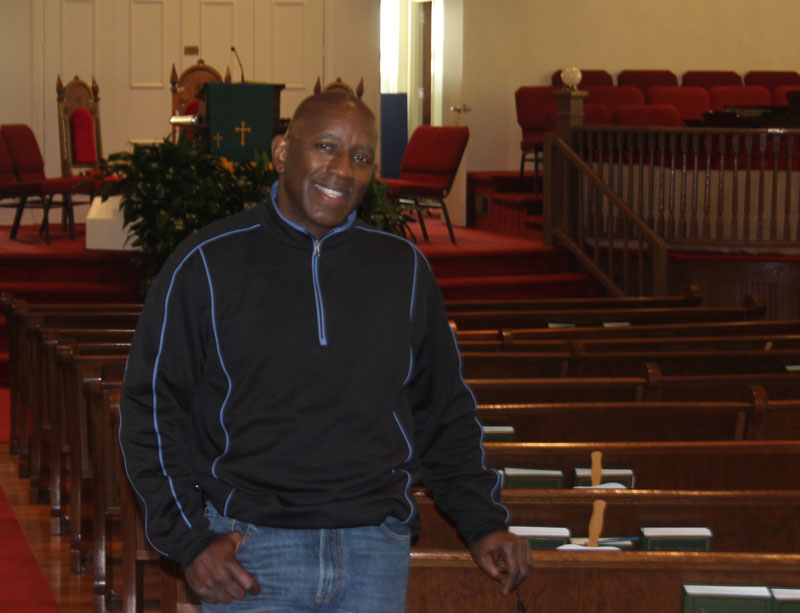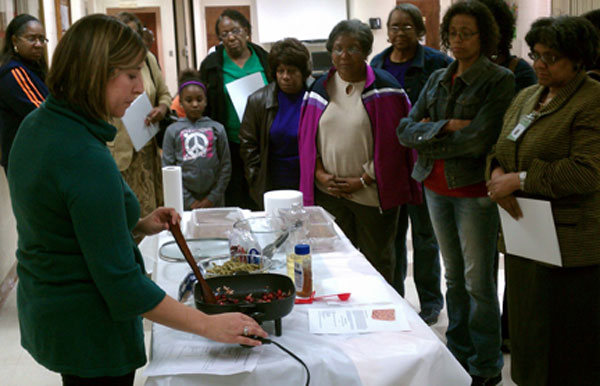College Hill Baptist Church Playing Key Role in Saving Lives Program
- November 30th, 2012
- in Saving Lives
By Kirsten J. Barnes
The April 2011 tornado may have torn down the walls of College Hill Baptist Church, but it did not break the spirit of the parishioners who worship there.
"The word of God teaches us that our body, mind and soul belong to Him," said the Rev. Kelvin Croom, pastor of the church temporarily meeting at University Church of Christ. "Our body is a dwelling place for his holy spirit and as a result of that we need to take care of it. One of the tricks of the devil is that he destroys the body; and if he destroys the body, he's won."
College Hill is one of three area churches, which recently partnered with the University of Alabama's Center for Community-Based Partnerships for a new initiative called "Saving Lives."
Saving Lives is a Community Affairs signature health care initiative. In the development of this wellness outreach program, community members and researchers collaborate to combine knowledge and action for social change to improve community health, reduce health disparities and increase health literacy.
Since January, the members of College Hill, Plum Grove and First African Baptist churches have been meeting once a month to discuss ways to become healthier physically as they grow spiritually.
In November, College Hill hosted Alabama Extension Agent Tera Glenn, whose work focuses on human nutrition, diet and health.
As the holidays approach, Glenn advised those attending the workshop not to make their stomachs the holiday wastebasket.
"Just because it's there, doesn't mean you have to eat it," Glenn told a group of about three dozen, advising them against snacking and sampling. "If it's enough to save, then save it. Don't let your stomach be the trash can."
Glenn said too often during holidays, people eat throughout the day and those who prepare the meals, nibble on broken cookies and food that stuck to the pan. In addition, she advised against perpetuating the "happy plate is a clean plate" phenomena.
"Get smaller plates," Glenn said. "Watch your portion size and exercise portion control."
The program targets minority groups as a way to help them combat poor eating habits with spiritual reinforcements so they can understand that God wants them to be more active so they can live fuller lives.
Croom knows first-hand the dangers of overeating. He changed his eating habits a year ago.
"I'm a prefect example, because I was killing myself by eating. Since a year ago I've lost right at 82 pounds," Croom said. "So, I know the value of good nutrition. This program was very timely."
At College Hill, Marcia Bailey and Jahnese Hobson are advocates for the program.
Bailey, who is a registered nurse, understands the importance of educating others about healthy lifestyles.
"When I looked at the information I thought it was something we could use," Bailey said of the Saving Lives curriculum. "Being a nurse, I felt it was something that would enlighten the church and help the membership."
So far, Saving Lives has attracted close to 50 people each month.
"We're working on our participation, but we're getting there," Bailey said. "We're still encouraging the members to come out to the meetings that we have."
Many people only think about diet changes for short periods of times, such as trying fade diets. Glenn advised against those and said instead people should opt for lifestyle changes.
College Hill Associate Pastor David Richardson said although he suffers from no known health problems, he still appreciates the information.
"Praise be to God, I'm completely healthy," Richardson said.
So far he's learned about diabetes, and the effects of age on weight gain.
"They also talked about how walking twice a day for 15 minutes can do so much for your cardiovascular system," Richardson said. "I have also implemented more discipline in my diet. In any area of life discipline is the key. The word disciple means disciplined one. The Bible tells us that you have to balance the physical with the spiritual."
The program is the brainchild of UA's Vice President of Community Affairs Samory Pruitt, who wanted to come up with a way to reach those who live in rural Alabama and inform them about things they can do to improve their quality of life physically and spiritually.
The three churches currently participating are part of a pilot program that will later spread to rural areas of Alabama.
"Somebody has got to say something, or we're going to eat ourselves to death," Pruitt said. "If you know better, you can do better."
Tameka Conwell has attended most of the meetings. She realizes she needs to make changes in her family's meal plan, but admits old habits are hard to break.
"I attended the session on stress and anxiety," said Conwell, adding that she has implemented some of the suggestions. However, she said implementing new portion sizes during the holidays would be difficult. "Follow up with me after the holidays and we'll see how I did."

